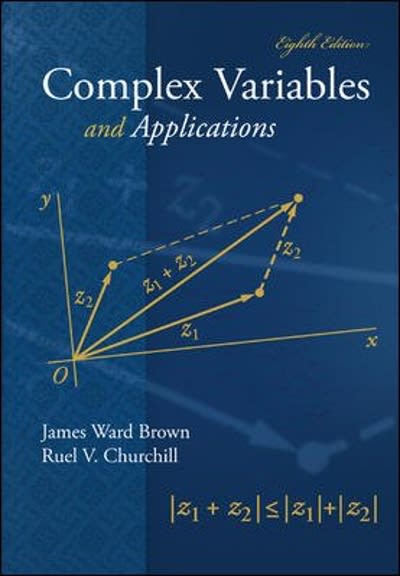Question
1. For this problem, carry at least four digits after the decimal in your calculations. Answers may vary slightly due to rounding. In a random
1. For this problem, carry at least four digits after the decimal in your calculations. Answers may vary slightly due to rounding.
In a random sample of 65 professional actors, it was found that 44 were extroverts.
(a)Let p represent the proportion of all actors who are extroverts. Find a point estimate for p. (Round your answer to four decimal places.) (b)Find a 95% confidence interval for p. (Round your answers to two decimal places.) lower limit upper limit Give a brief interpretation of the meaning of the confidence interval you have found. i. We are 5% confident that the true proportion of actors who are extroverts falls above this interval.
ii. We are 5% confident that the true proportion of actors who are extroverts falls within this interval.
iii. We are 95% confident that the true proportion of actors who are extroverts falls within this interval.
iv. We are 95% confident that the true proportion of actors who are extroverts falls outside this interval.
(c)Do you think the conditions np > 5 and nq > 5 are satisfied in this problem? Explain why this would be an important consideration. i. Yes, the conditions are satisfied. This is important because it allows us to say that p is approximately normal.
ii. No, the conditions are not satisfied. This is important because it allows us to say that p is approximately normal. iii. No, the conditions are not satisfied. This is important because it allows us to say that p is approximately binomial.
iv. Yes, the conditions are satisfied. This is important because it allows us to say that p is approximately binomial.
2. Suppose we have a binomial experiment in which success is defined to be a particular quality or attribute that interests us.
(a)Suppose n = 36 and p = 0.29. (For each answer, enter a number. Use 2 decimal places.) np = nq = Can we approximate p by a normal distribution? Why? (Fill in the blank. There are four answer blanks. A blank is represented by _____.) _____, p _____ be approximated by a normal random variable because _____ _____. first blank Yes or No
second blank can or cannot
third blank i. np does not exceed
ii. both np and nq exceed
iii. nq does not exceed
iv. np exceeds
v. nq exceeds
vi. np and nq do not exceed
fourth blank (Enter an exact number.) What are the values of p and p? (For each answer, enter a number. Use 3 decimal places.) p = mu sub p hat = p = sigma sub p hat = (b)Suppose n = 25 and p = 0.15. Can we safely approximate p by a normal distribution? Why or why not? (Fill in the blank. There are four answer blanks. A blank is represented by _____.) _____, p _____ be approximated by a normal random variable because _____ _____. first blank Yes or No
second blank can or cannot
third blank i. n.p does not exceed
ii. both np and nq exceed
iii. nq does not exceed
iv. np exceeds
v. nq exceeds
vi. np and nq do not exceed
fourth blank (Enter an exact number.)____ (c)Suppose n = 40 and p = 0.17. (For each answer, enter a number. Use 2 decimal places.) np = _____ nq = _____ Can we approximate p by a normal distribution? Why? (Fill in the blank. There are four answer blanks. A blank is represented by _____.) _____, p _____ be approximated by a normal random variable because _____ _____. first blank Yes or No
second blank can or cannot
third blank i. np does not exceed
ii. both np and nq exceed
iii. nq does not exceed
iv. np exceeds
v. nq exceeds
vi. np and nq do not exceed
fourth blank (Enter an exact number.)_____ What are the values of p and p? (For each answer, enter a number. Use 3 decimal places.) p = mu sub p hat = _____ p = sigma sub p hat = _____
Step by Step Solution
There are 3 Steps involved in it
Step: 1

Get Instant Access to Expert-Tailored Solutions
See step-by-step solutions with expert insights and AI powered tools for academic success
Step: 2

Step: 3

Ace Your Homework with AI
Get the answers you need in no time with our AI-driven, step-by-step assistance
Get Started


